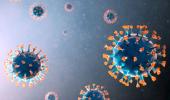While virologists say theoretically the vaccine that works on Delta should work on the Delta Plus variant as well, more research is needed, reports Sohini Das.

Delta and Delta Plus variants of Sars-CoV-2 are causing concern among doctors and researchers as the world tries to map the spread, virulence and potential risks of these mutations. India has said that Delta Plus is a variant of concern. But what are these variants, where did they originate and are vaccines effective against them? Let’s find out.
What is the Delta variant of Sars-CoV-2 and what is its origin?
All viruses, including SARS-CoV-2 that causes Covid-19, change over time. Most changes have little to no impact on the virus’ properties. However, some changes may affect how easily the virus spreads and the associated severity of the disease, the performance of vaccines, therapeutic medicines, diagnostic tools, or other public health and social measures.
The earliest documented examples of the Delta variant, officially named B.1.617.2, are from India, according to the World Health Organization.
In April this year, the WHO classified the Delta variant as a “variant of interest”-- a variant that warranted close monitoring because of its potential risk. But in May, it reclassified it as a “variant of concern” -- to signify that it posed additional risks to public health.
This strain is thought to be behind the second wave of infections in India.
What is the Delta Plus variant?
The Delta Plus, or Delta-AY.1 variant, is a mutated version of the B.1.617.2 variant or strain. This strain is characterised by the K417N mutation in the spike protein of the SARS-CoV2 virus that causes the Covid-19 disease.
According to reports, the K417N mutation has been associated with “immune escape”, which basically means that the virus is less susceptible to -- or less responsive to -- any drug therapy. The Indian government has said that the Delta Plus variant is not a variant of concern.
Where did Delta Plus originate and in which countries do we find it now?
The Indian government has said that the variant has been seen in Europe since March.
Public Health England, an executive agency of the Department of Health and Social Care in the United Kingdom, has said that the Delta Plus variant has been identified in six genomes from India till June 7. These sequences have been found in genomes from 10 countries so far, some scientists have said. United States, Canada, UK, Japan, Portugal, Poland, Russia, Turkey, Nepal and Switzerland are among the countries that have reported this strain.
“The variant prevalent in the US is called Alfa; the one prevalent in South America is Beta and the one in Africa is Theta. And the European countries have seen the prevalence of Gamma, besides Theta,” explained Chandrashekhar T, chief intensivist, Fortis Hiranandani Hospital, Vashi, Mumbai.
He added that Delta was by and large prevalent in India and Asia, and has now spread to other nations, too. The Kappa variant was prevalent in Australia. “The Delta variant was there in the first wave as well. However, the coronavirus is in constant mutation, with increasing transmissibility and virulence,” the doctor said.
How virulent are these variants?
The Delta Plus variant is said to be resisting the monoclonal antibody cocktail -- Casirivimab and Imdevimab -- treatment given to high-risk Covid-19 patients in the early stages of this disease. This treatment recently got the nod in India from the drug regulator.
Scientists, however, are not certain if this resistance means that the new variant has a higher transmission rate or that it causes more severe infection compared to the other predominant strains.
Chandrashekhar said that it is believed to be 60 per cent more transmissible than the B.1.1.7 variant (or the alpha variant) and may be associated with an increased disease severity such as hospitalisation risk.
Are Covishield, Covaxin, Pfizer, Sputnik and other vaccines effective against the Delta and Delta Plus variants?
According to Public Health England, Pfizer and AstraZeneca vaccines offer protection against the Delta variant. The protection is more than 90 per cent against hospitalisation or getting severe disease.
Covaxin, the Bharat Biotech vaccine, also offers protection against the Delta variant, the company and the Indian Council of Medical Research have claimed.
Sputnik V’s official Twitter handle claimed it works against the Delta variant, too. It said it was more “efficient” than any other vaccine.
A study conducted by the All India Institute of Medical Sciences, Delhi, and the National Centre for Disease Control recently said that the Delta variant can infect partially or fully vaccinated people. The infection does not become severe, however.
While virologists say theoretically the vaccine that works on Delta should work on the Delta Plus variant as well, more research is needed.











